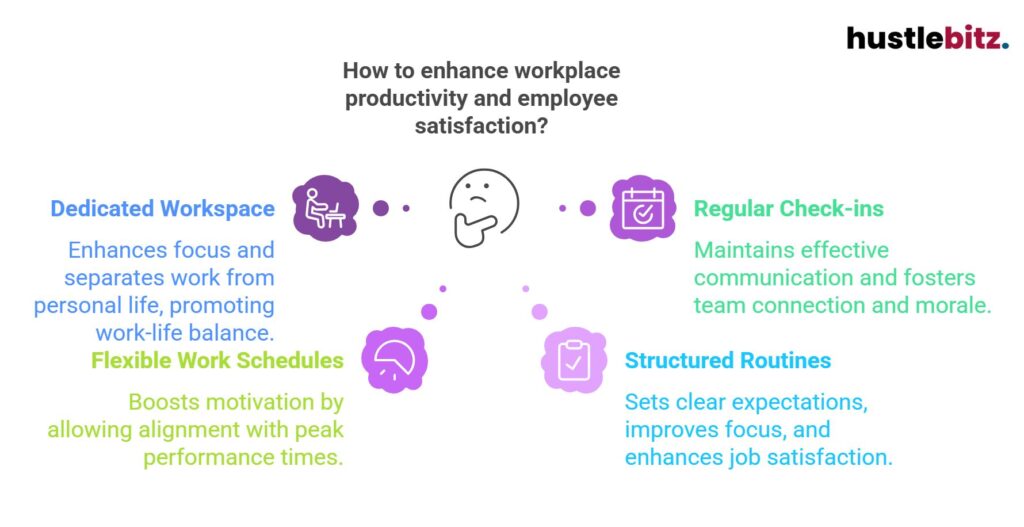Motivation for remote work significantly depends on fostering an engaging home environment. Establishing a dedicated workspace helps separate professional from personal life, enhancing focus and productivity. Effective communication strategies, including regular check-ins and informal interactions, are crucial for maintaining team connections. Flexibility in work schedules aligns tasks with peak performance times, supporting a better work-life balance. Incorporating structured routines can reinforce focus and employee satisfaction. Moreover, addressing burnout through wellness programs and celebrating team achievements are key strategies. These elements create a motivated remote workforce, making it essential to explore further insights for sustained engagement and success.
Key Takeaways
- Establish a dedicated workspace to enhance focus and separate professional responsibilities from personal life, promoting work-life balance.
- Implement regular check-ins and use tech tools to maintain effective communication, fostering team connection and morale.
- Embrace flexibility in work schedules to boost motivation, allowing employees to align tasks with peak performance times.
- Encourage structured routines and clear work policies to set expectations, improve focus, and enhance job satisfaction.
- Provide opportunities for professional development to make employees feel valued, fostering engagement and reducing feelings of isolation.

Creating a Productive Home Environment to Enhance Remote Work Motivation

Establishing a dedicated and organized workspace at home is essential for fostering motivation and enhancing productivity in remote work settings. A well-structured work environment allows employees to separate their professional responsibilities from personal life, thereby supporting a healthier work-life balance. This separation is crucial for remote employees engaged in work from home arrangements, as it helps reduce distractions and improves focus.
To create an effective home office, consider designating a specific area that is free from interruptions. This space should be equipped with the necessary tools and technology to facilitate seamless communication and collaboration with team members. Utilizing reliable communication tools can strengthen employee engagement, ensuring remote workers feel connected and valued, even from a distance.
In addition to a physical workspace, the overall work environment should promote a sense of belonging and motivation. Incorporating elements that reflect personal style can enhance comfort and inspire creativity, ultimately improving productivity. Regular team-building activities, even in a virtual format, can further reinforce connections among remote employees, fostering a sense of community.
Moreover, setting boundaries around work hours can help maintain a healthy work-life balance, mitigating burnout and promoting sustained engagement. By thoughtfully curating a productive home environment, organizations can empower remote employees to remain focused and motivated, leading to higher overall performance and satisfaction in their roles.
Effective Communication Strategies to Keep Remote Teams Engaged
Effective communication is crucial for maintaining engagement and collaboration within remote teams, ensuring that all members feel included and informed despite physical distances. Implementing effective communication strategies can significantly enhance employee productivity and motivation, which are essential for a thriving remote work environment.
Regular check-ins are one of the most effective strategies to keep remote workers motivated. These scheduled interactions allow team leaders to gauge motivation levels and address any concerns, fostering an open dialogue. Utilizing tech tools, such as video conferencing and instant messaging platforms, can facilitate these check-ins and maintain a sense of connection among team members.
Employee recognition plays a vital role in sustaining engagement. Acknowledging individual contributions, whether through shout-outs in team meetings or recognition platforms, reinforces a positive company culture. This can significantly impact morale and motivate employees to perform at their best.
Additionally, promoting informal communication channels, such as virtual coffee breaks or team-building activities, can help strengthen relationships within remote teams. These social interactions not only enhance camaraderie but also encourage a collaborative atmosphere where employees feel valued.
In essence, implementing effective communication strategies that include regular check-ins, employee recognition, and fostering a strong company culture can significantly influence the motivation of remote workers. By prioritizing these practices, organizations can ensure that their remote teams remain engaged and productive, ultimately contributing to the overall success of the company.
The Role of Flexibility in Boosting Motivation for Remote Workers

Flexibility in work schedules and environments can significantly enhance motivation for remote workers, complementing the communication strategies that foster engagement within teams. By allowing remote employees to tailor their work hours and locations, companies can create a more adaptable atmosphere that acknowledges the diverse personal lives of their workforce. This flexibility is essential in helping remote workers feel valued and understood, ultimately leading to a more motivated and engaged team.
When remote workers are given the autonomy to choose when and where they work, they often report higher levels of job satisfaction. This satisfaction translates to increased productivity, as employees can align their work with their peak performance times. Consequently, remote employees become not only happier but also more committed to achieving company goals. This alignment fosters a culture where employee motivation flourishes, driven by the understanding that their individual needs are being recognized.
Furthermore, flexibility encourages a healthy work-life balance, which is vital for maintaining motivation. When remote workers are engaged and motivated, they are more likely to contribute positively to team dynamics and overall company performance. Communication is key in this process; regular check-ins and feedback loops ensure that employees feel connected and supported, reinforcing a sense of belonging.
Implementing best practices around flexibility not only boosts individual motivation but also enhances team cohesion, creating an environment where remote employees can thrive. In essence, flexibility is a powerful tool for organizations aiming to keep their remote workers motivated and engaged.
Incorporating Routine and Structure to Maintain Focus While Working from Home

A consistent routine and structured approach to the workday can significantly enhance focus and productivity for remote workers navigating the challenges of a home environment.
Establishing a clear work policy is essential for setting expectations regarding work hours and availability. By delineating when employees are expected to be online, organizations can foster an environment where remote workers feel accountable and engaged.
Incorporating routine and structure into daily schedules not only helps in maintaining focus but also contributes to employee satisfaction. When remote employees have a set start and end time, they can better manage their tasks throughout the day, leading to improved efficiency.
Additionally, frequent check-ins and the use of project management tools can enhance communication, making remote workers feel more connected to their teams.
Moreover, managing remote teams effectively requires leaders to motivate remote employees to adhere to their routines. This motivation can stem from recognizing and rewarding consistent efforts, which keeps remote workers happy and engaged.
By empowering employees to create personalized routines that fit their work styles, organizations can cultivate a more productive remote workforce.
Ultimately, the combination of routine, structure, and clear communication fosters an atmosphere where employees feel valued and engaged.
As remote work continues to evolve, these strategies will be vital for companies aiming to maintain high levels of productivity and morale within their teams.
Balancing Work and Personal Life: Strategies for Remote Worker Motivation
Striking a harmonious balance between work and personal life is crucial for maintaining motivation among remote workers. Achieving this equilibrium not only helps to keep remote workers happy but also enhances their productivity and overall job satisfaction. To motivate remote employees effectively, organizations must emphasize the importance of work-life balance within their virtual office settings.
Employers can adopt several strategies to ensure employees remain engaged while working from home. Firstly, implementing structured work hours can help delineate professional responsibilities from personal time. This clarity fosters a sense of purpose, allowing team members to focus on their tasks during work hours and enjoy their personal lives afterward.
Utilizing tools like Slack and video conferencing can strengthen communication and collaboration while minimizing the isolation that often accompanies remote work. Regular check-ins and team meetings can keep employees motivated and ensure they feel connected to their colleagues.
Additionally, promoting adaptive performance—where employees are encouraged to adjust their work styles based on their unique circumstances—can further enhance job satisfaction.
Lastly, fostering a culture that values personal well-being is essential. Encouraging employees to take breaks, prioritize self-care, and engage in social activities can significantly improve morale.
Innovative Ways to Prevent Burnout and Keep Remote Workers Energized

Maintaining a healthy work-life balance is foundational, but organizations must also implement innovative strategies to actively prevent burnout and keep remote workers energized. One effective approach is to leverage tools like virtual wellness programs and online social platforms that encourage team interaction. These tools not only help remote employees feel connected but also foster a sense of community, reducing feelings of isolation that can lead to burnout.
Furthermore, organizations can motivate their remote workers by offering flexible schedules. Allowing employees to choose their own working hours can lead to a more engaged workforce, as individuals can align their work with their peak productivity times. Regular check-ins and feedback sessions also play a critical role in enhancing engagement. By acknowledging achievements and addressing challenges, managers can help remote employees stay focused and happy.
In addition, providing opportunities for professional development can significantly contribute to a remote employee’s sense of purpose. By investing in training and skill enhancement, companies can help their workforce feel valued, ultimately benefiting the company’s overall performance. Encouraging breaks and promoting a culture where taking time off is supported can also help maintain energy levels.
Lastly, celebrating team successes, whether big or small, can uplift morale and reinforce a shared vision. By cultivating an environment where remote workers feel appreciated and energized, organizations can mitigate burnout and promote a workforce that is not only productive but also fulfilled.
Final Thoughts
Maintaining motivation and engagement in a remote work setting requires intentional strategies that address the unique challenges of working from home. By creating a dedicated workspace, fostering effective communication, and offering flexibility, organizations can enhance the motivation of their remote employees. Incorporating structured routines and promoting a healthy work-life balance further contributes to sustained productivity and job satisfaction. Additionally, innovative approaches to prevent burnout, such as virtual wellness programs and regular feedback, play a crucial role in keeping remote workers energized and focused. As remote work continues to evolve, these strategies will be essential in ensuring a motivated, engaged, and productive workforce.




